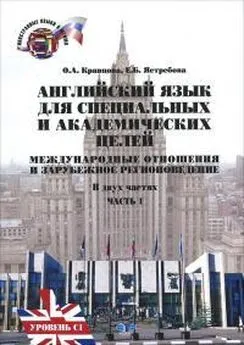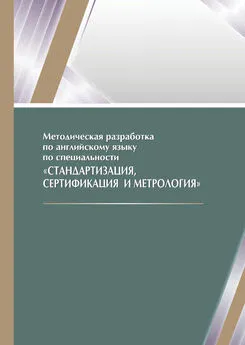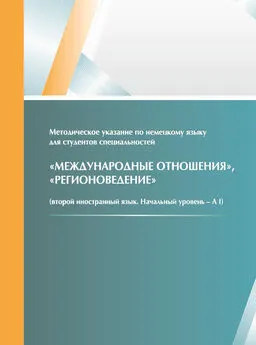Ольга Кравцова - Английский язык для специальных и академических целей: Международные отношения и зарубежное регионоведение. Часть 1
- Название:Английский язык для специальных и академических целей: Международные отношения и зарубежное регионоведение. Часть 1
- Автор:
- Жанр:
- Издательство:МГИМО-Университет
- Год:2015
- ISBN:978-5-9228-1210-8
- Рейтинг:
- Избранное:Добавить в избранное
-
Отзывы:
-
Ваша оценка:
Ольга Кравцова - Английский язык для специальных и академических целей: Международные отношения и зарубежное регионоведение. Часть 1 краткое содержание
Адресовано студентам четвертого курса факультетов и отделений международных отношений и зарубежного регионоведения.
Английский язык для специальных и академических целей: Международные отношения и зарубежное регионоведение. Часть 1 - читать онлайн бесплатно полную версию (весь текст целиком)
Интервал:
Закладка:
This unchallenged faith in American exceptionalism makes it harder for Americans to understand why others are less enthusiastic about US dominance, often alarmed by US policies, and frequently irritated by what they see as US hypocrisy, whether the subject is possession of nuclear weapons, conformity with international law, or America's tendency to condemn the conduct of others while ignoring its own failings. Ironically, US foreign policy would probably be more effective if Americans were less convinced of their own unique virtues and less eager to proclaim them.
What we need, in short, is a more realistic and critical assessment of America's true character and contributions. In that spirit, I offer here the Top 5 Myths about American Exceptionalism.
There Is Something Exceptional About American Exceptionalism
Whenever American Leaders refer to the “unique” responsibilities of the United States, they are saying that it is different from other powers and that these differences require them to take on special burdens.
Yet there is nothing unusual about such lofty declarations; indeed, those who make them are treading a well-worn path. Most great powers have considered themselves superior to their rivals and have believed that they were advancing some greater good when they imposed their preferences on others. The British thought they were bearing the “white man's burden”, while French colonialists invoked la mission civilisatrice to justify their empire. Portugal, whose imperial activities were hardly distinguished, believed it was promoting a certain missao civilizadora. Even many officials of the former Soviet Union genuinely believed they were leading the world toward a socialist utopia despite the many cruelties that communist rule inflicted. Of course, the United States has by far the better claim to virtue than Stalin or his successors, but Obama was right to remind us that all countries prize their own particular qualities.
So when Americans proclaim they are exceptional and indispensable, they are simply the latest nation to sing a familiar old song. Among great powers, thinking you're special is the norm, not the exception.
The United States Behaves Better Than Other Nations Do
Declarations of American exceptionalism rest on the belief that the United States is a uniquely virtuous nation, one that loves peace, nurtures liberty, respects human rights, and embraces the rule of law. Americans like to think their country behaves much better than other states do, and certainly better than other great powers.
Unit II. US: from Democracy to Empire?
Unit II. US: from Democracy to Empire?
If only it were true. The United States may not have been as brutal as the worst states in world history, but a dispassionate look at the historical record belies most claims about America's moral superiority.
For starters, the United States has been one of the most expansionist powers in modern history. It began as 13 small colonies clinging to the Eastern Seaboard, but eventually expanded across North America, seizing Texas, Arizona, New Mexico, and California from Mexico in 1846. Along the way, it eliminated most of the native population and confined the survivors to impoverished reservations. By the mid-19 thcentury, it had pushed Britain out of the Pacific Northwest and consolidated its hegemony over the Western Hemisphere.
The United States has fought numerous wars since then — starting several of them — and its wartime conduct has hardly been a model of restraint. [...] The United States dropped more than 6 million tons of bombs during the Indochina war, including tons of napalm and lethal defoliants like Agent Orange, and it is directly responsible for the deaths of many of the roughly 1 million civilians who died in that war.
[...] US drones and Special Forces are going after suspected terrorists in at least five countries at present and have killed an unknown number of innocent civilians in the process. Some of these actions may have been necessary to make Americans more prosperous and secure. But while Americans would undoubtedly regard such acts as indefensible if some foreign country were doing them to us, hardly any US politicians have questioned these policies. Instead, Americans still wonder, “Why do they hate us?”
The United States talks a good game on human rights and international law, but it has refused to sign most human rights treaties, is not a party to the International Criminal Court, and has been all too willing to cozy up to dictators — remember our friend Hosni Mubarak? — with abysmal human rights records. If that were not enough, the abuses at Abu Ghraib and the George W. Bush administration's reliance on waterboarding 1, extraordinary rendition 37 37 Waterboarding — an interrogation technique in which water is forced into a detainee's mouth and nose so as to induce the sensation of drowning
38 38 Extraordinary rendition — (especially in the US) the practice of sending a foreign criminal or terrorist suspect covertly to be interrogated in a country with less rigorous regulations for the humane treatment of prisoners
, and preventive detention should shake America's belief that it consistently acts in a morally superior fashion. Obama's decision to retain many of these policies suggests they are not temporary aberration.
The United States never conquered a vast overseas empire or caused millions to die through tyrannical blunders like China's Great Leap Forward or Stalin's forced collectivization. And given the vast power at its disposal for much of the past century, Washington certainly could have done much worse. But the record is clear: US leaders have done what they thought they had to do when confronted by external dangers, and they paid scant attention to moral principles along the way. The idea that the United States is uniquely virtuous may be comforting to Americans; too bad it's not true.
America's Success Is Due to Its Special Genius
The United States has enjoyed remarkable success, and Americans tend to portray their rise to world power as a direct result of the political foresight of the Founding Fathers, the virtues of the
US Constitution, the priority placed on individual liberty, and the creativity and hard work of the American people. In this narrative, the United States enjoys an exceptional global position today because it is, well, exceptional.
There is more than a grain of truth to this version of American history. It's not an accident that immigrants came to America in droves in search of economic opportunity, and the “melting pot” myth facilitated the assimilation of each wave of new Americans. America's scientific and technological achievements are fully deserving of praise and owe something to the openness and vitality of the American political order.
But America's past success is due as much to good luck as to any uniquely American virtues. The new nation was lucky that the continent was lavishly endowed with natural resources and traversed by navigable rivers. It was lucky to have been founded far from the other great powers and even luckier that the native population was less advanced and highly susceptible to European diseases. Americans were fortunate that the European great powers were at war for much of the republic's early history, which greatly facilitated its expansion across the continent, and its global primacy was ensured after the other great powers fought two devastating world wars. This account of America's rise does not deny that the United States did many things right, but it also acknowledges that America's present position owes as much to good fortune as to any special genius or “manifest destiny”.
The United States Is Responsible for Most of the Good in the World
Americans are fond of giving themselves credit for positive international developments. President Bill Clinton believed the United States was “indispensable to the forging of stable political relations,” and the late Harvard University political scientist Samuel P. Huntington thought US primacy was central “to the future of freedom, democracy, open economies, and international order in the world” [...] Given all the high-fives American leaders have given themselves, it is hardly surprising that most Americans see their country as an overwhelmingly positive force in world affairs.
Once again, there is something to this line of argument, just not enough to make it entirely accurate. The United States has made undeniable contributions to peace and stability in the world over the past century, including the Marshall Plan, the creation and management of the Bretton Woods system, its rhetorical support for the core principles of democracy and human rights, and its mostly stabilizing military presence in Europe and the Far East. But the belief that all good things flow from Washington's wisdom overstates the US contribution by a wide margin.
For starters, though Americans watching Saving Private Ryan or Patton may conclude that the United States played the central role in vanquishing Nazi Germany, most of the fighting was in Eastern Europe and the main burden of defeating Hitler's war machine was borne by the Soviet Union. Similarly, though the Marshall Plan and NATO played important roles in Europe's postWorld War II success, Europeans deserve at least as much credit for rebuilding their economies, constructing a novel economic and political union, and moving beyond four centuries of sometimes bitter rivalry. [...] Moreover, [...] the spread of liberal ideals is a global phenomenon with roots in the Enlightenment, and European Philosophers and political leaders did much to advance the democratic ideal. Similarly, the abolition of slavery and the long effort to improve the status of women owe more to Britain and other democracies than to the United States, where progress in both areas trailed many other countries. [...]
Unit II. US: from Democracy to Empire?
Unit II. US: from Democracy to Empire?
Finally, any honest accounting of the past half-century must acknowledge the downside of American primacy. The United States has been the major producer of greenhouse gases for most of the last hundred years and thus a principal cause of the adverse changes that are altering the global environment. The United States stood on the wrong side of the long struggle against apartheid in South Africa and backed plenty of unsavory dictatorships — including Saddam Hussein's — when short-term strategic interests dictated. [...]
Bottom line: Americans take too much credit for global progress and accept too little blame for areas where US policy has in fact been counterproductive. Americans are blind to their weak spots, and in ways that have real-world consequences. [...]
God Is on Our Side
A crucial component of American exceptionalism is the belief that the United States has a divinely ordained mission to lead the rest of the world. Ronald Reagan told audiences that there was “some divine plan" that placed America here [...]. The same idea was expressed, albeit less nobly, in Otto von Bismarck's alleged quip that “God has a special providence for fools, drunks, and the United States."
Confidence is a valuable commodity for any country. But when a nation starts to think it enjoys the mandate of heaven and becomes convinced that it cannot fail or be led astray by scoundrels or incompetents, then reality is likely to deliver a swift rebuke. [.]
Despite America's many successes, the country is hardly immune from setbacks, follies, and boneheaded blunders. If you have doubts about that, just reflect on how a decade of ill-advised tax cuts, two costly and unsuccessful wars, and a financial meltdown driven mostly by greed and corruption have managed to squander the privileged position the United States enjoyed at the end of the 20 thcentury. Instead of assuming that God is on their side, perhaps Americans should heed Abraham Lincoln's admonition that our greatest concern should be “whether we are on God's side." [.]
Читать дальшеИнтервал:
Закладка:










